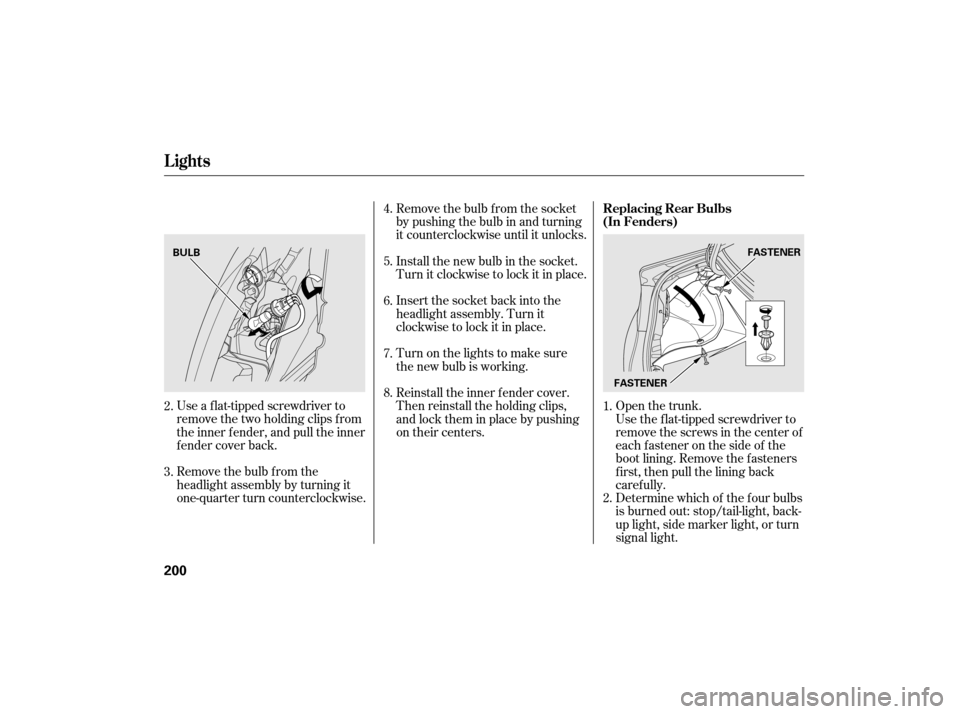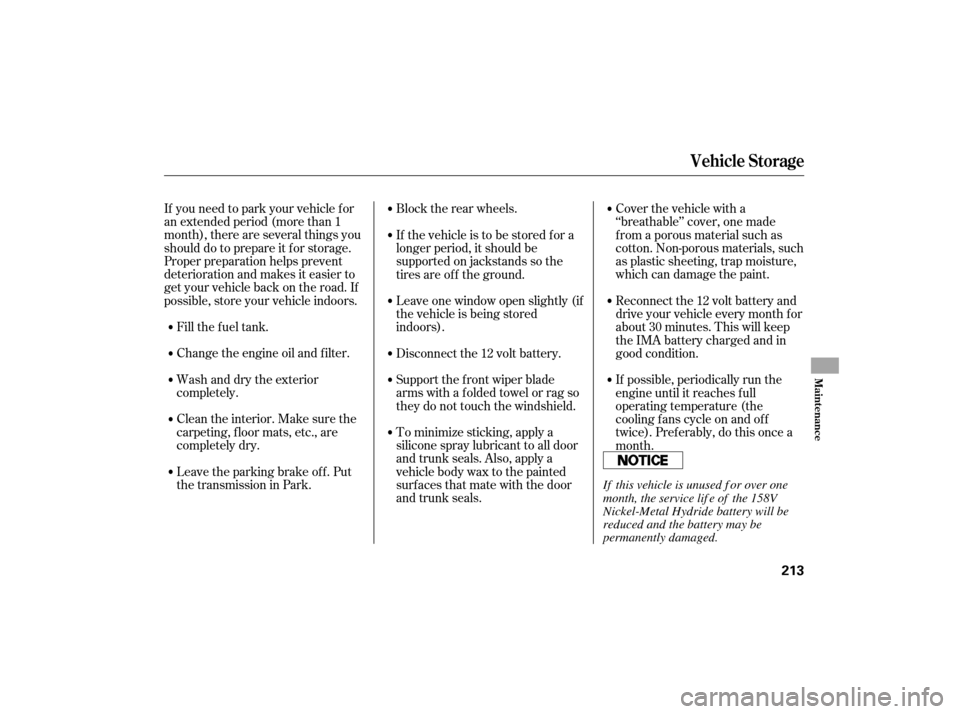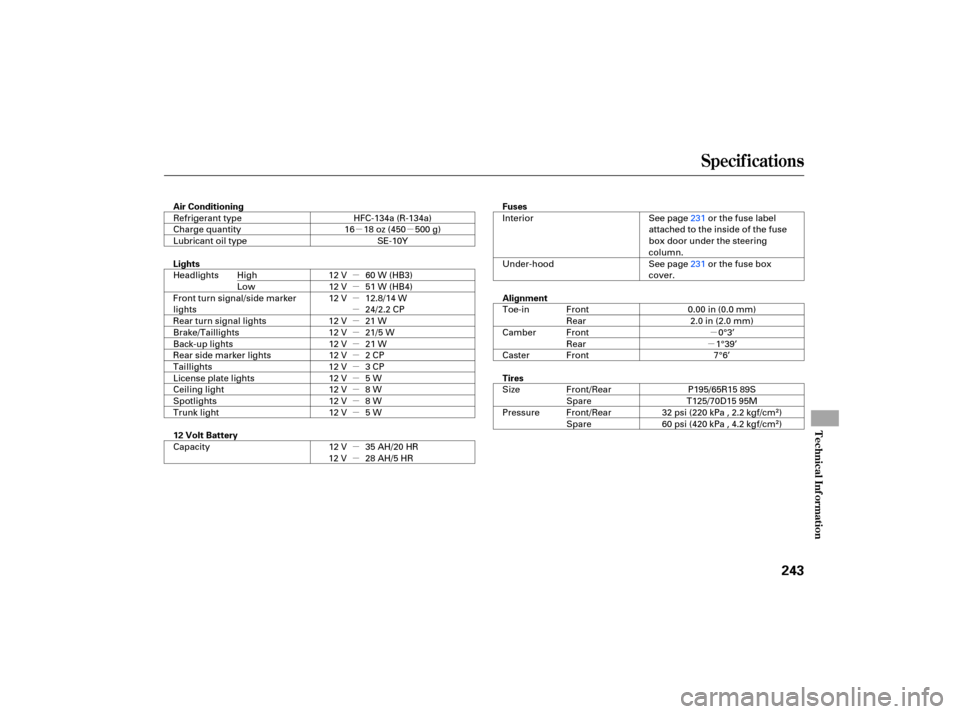Page 203 of 268

Open the trunk.
Use a f lat-tipped screwdriver to
remove the two holding clips f rom
the inner f ender, and pull the inner
f ender cover back. Remove the bulb f rom the socket
by pushing the bulb in and turning
it counterclockwise until it unlocks.
Install the new bulb in the socket.
Turn it clockwise to lock it in place.
Insert the socket back into the
headlight assembly. Turn it
clockwise to lock it in place.
Reinstall the inner f ender cover.
Then reinstall the holding clips,
andlocktheminplacebypushing
on their centers. Turn on the lights to make sure
the new bulb is working.
Remove the bulb f rom the
headlight assembly by turning it
one-quarter turn counterclockwise. Use the f lat-tipped screwdriver to
remove the screws in the center of
each f astener on the side of the
boot lining. Remove the f asteners
first, then pull the lining back
caref ully.
Determine which of the f our bulbs
is burned out: stop/tail-light, back-
up light, side marker light, or turn
signal light.
1.
4.
5.
6.
7.
8.
3. 2.
2. Replacing Rear Bulbs
(In Fenders)
Lights
200
FASTENERFASTENER
BULB
Page 204 of 268
Remove the socket by turning it
one-quarter turn counterclockwise.
Pull the bulb straight out of its
socket. Push the new bulb straight
into the socket until it bottoms.
Reinstall the socket into the light
assembly by turning it clockwise
until it locks.Put the f asteners into the holes on
the side of the trunk lining.
Reinstall the screws. Reinstall the trunk lining. Make
sure it is installed under the edge
of the trunk seal. Turn on the lights to make sure
the new bulb is working.
Open the trunk.
Use the Phillips-head screwdriver to
remove the screws in the center of
each f astener on the back of the boot
lid. Remove the f asteners f irst, then
pull the lining back caref ully. 1.
4.
5. 6.
7.
8.
3.
CONT INUED
Replacing Rear Bulbs
(in T runk L id)
Lights
Maint enance
201
BULBS
SOCKETS SOCKETS
BULB
BULB FASTENER
Page 205 of 268
Pull the bulb straight out of its
socket. Push the new bulb straight
into the socket until it bottoms.
Insert the socket back into the
light assembly. Turn it clockwise
to lock it in place.
Push the trunk lid trim back into
position.
Put the f asteners into the holes on
the trunk lid trim. Reinstall the
screws.Beforeusinganautomaticcarwash,
remove the radio antenna so it does
not get damaged. Remove the
antenna by unscrewing it. When you
reinstall the antenna, tighten it
securely.
Bef ore entering or parking in areas
with low ceiling height, remove the
antenna.
Turn on the lights to make sure
the new bulb is working.
Remove the socket by turning it
one-quarter turn counterclockwise.
2. 3.
4.
5.
6.
7.
Roof A ntenna
Lights, Roof Antenna
202
BULB
SOCKET
Page 216 of 268

Fill the f uel tank.
Change the engine oil and f ilter.Block the rear wheels.
Wash and dry the exterior
completely.
Cleantheinterior.Makesurethe
carpeting, floor mats, etc., are
completely dry.
If you need to park your vehicle f or
an extended period (more than 1
month), there are several things you
should do to prepare it f or storage.
Proper preparation helps prevent
deterioration and makes it easier to
get your vehicle back on the road. If
possible, store your vehicle indoors. Leave one window open slightly (if
the vehicle is being stored
indoors).Cover the vehicle with a
‘‘breathable’’ cover, one made
f rom a porous material such as
cotton. Non-porous materials, such
as plastic sheeting, trap moisture,
which can damage the paint.
To minimize sticking, apply a
silicone spray lubricant to all door
and trunk seals. Also, apply a
vehiclebodywaxtothepainted
surfaces that mate with the door
and trunk seals. Support the f ront wiper blade
arms with a f olded towel or rag so
they do not touch the windshield. Disconnect the 12 volt battery. Reconnect the 12 volt battery and
drive your vehicle every month f or
about 30 minutes. This will keep
the IMA battery charged and in
good condition.
Leave the parking brake off. Put
the transmission in Park. If the vehicle is to be stored f or a
longer period, it should be
supported on jackstands so the
tires are of f the ground.
If possible, periodically run the
engine until it reaches f ull
operating temperature (the
cooling f ans cycle on and of f
twice). Pref erably, do this once a
month.
Vehicle Storage
Maint enance
213
If this vehicle is unused f or over one
month, the service lif e of the 158V
Nickel-Metal Hydride battery will be
reduced and the battery may be
permanently damaged.
Page 220 of 268
CONT INUED
If you have a f lat tire while driving,
stop in a saf e place to change it.
Drive slowly along the shoulder until
you get to an exit or an area to stop
that is far away from the traffic lanes.Park the vehicle on f irm, level, and
non-slippery ground. Put the
transmission in Park. Apply the
parking brake.Open the trunk. Raise the trunk
f loor by lif ting up on the back edge.
Turn on the hazard warning lights,
and turn the ignition switch to the
LOCK (0) position. Have all
passengers get out of the vehicle
while you change the tire. Take the tool case out of the spare
tire.
Unscrew the wing bolt and take
the spare tire out of its well.
5. 4.
3.
2. 1.
Changing a Flat Tire
T aking Care of t he Unexpect ed
217
JACK
SPARE TIRE
TRUNK FLOOR TOOL CASE
The vehicle can easily roll off
the jack, seriously injuring
anyone underneath.
Follow the directions for
changing a tire exactly, and
never get under the vehicle
when it is supported only by the
jack.
Page 223 of 268
Tighten the wheel nuts securely in
the same crisscross pattern. Have
the wheel nut torque checked at
the nearest automotive service
f acility.
Tighten the wheel nuts to:Place the flat tire face down in the
spare tire well.
Remove the spacer cone f rom the
wing bolt, turn it over, and put it
back on the bolt.
Securetheflattirebyscrewing
the wing bolt back into its hole.Store the jack in the tool case.
Store the center cap in the trunk.
Make sure it does not get
scratched or damaged.
Lower the trunk f loor, then close
the trunk lid.
14. 15.
16.
17.18.
19.
20.
Changing a Flat Tire
220
SPACER CONE
WING BOLT
For normal
tire For spare
tire
80 lbf·ft (108 N·m , 11 kgf·m) Loose items can fly around the
interior in a crash and could
seriously injure the occupants.
Store the wheel, jack, and tools
securely before driving.
Page 246 of 268

�µ�µ�µ�µ
�µ
�µ
�µ
�µ
�µ
�µ
�µ
�µ
�µ
�µ
�µ
�µ
�µ
�µ
�µ
Specifications
T
echnical Inf ormat ion
243
Air Conditioning Fuses
Alignment
12 Volt Battery Tires
Lights
HFC-134a
(R-134a)
16 18 oz (450 500 g)
SE-10Y
12 V 60 W
12 V 3 CP
12
V 21/5 W
12
V 21 W
7°6’1°39’ 0°3’
0.00
in (0.0 mm)
P195/65R15 89S
2.0
in (2.0 mm)
Refrigerant
type
Charge quantity
Lubricant oil type Interior
Under-hood
Toe-in
Camber
Caster
12
V 12.8/14 W
12
V 51 W
12 V 21 W
12 V
12 V
12 V
12 V 5W
8W
8W
5W
Capacity 12 V 35 AH/20 HR T125/70D15
95M
32 psi (220 kPa , 2.2 kgf/cm
)
60 psi (420 kPa , 4.2 kgf/cm)
Size
Pr
essure
12
V 2 CP See
page 231 or the fuse label
attached to the inside of the fuse
box door under the steering
column.
See page 231 or the fuse box
cover.
Headlights
Front turn signal/side marker
lights
Rear turn signal lights
Brake/Taillights
Back-up lights
Rear side marker lights
Taillights
License plate lights
Ceiling light
Spotlights
Trunk light
12 V 28 AH/5 HR24/2.2 CP Front
Rear
Front
Rear
Front
High
Low
(HB3)
(HB4)
Front/Rear
Spare
Front/Rear
Spare
Page 262 of 268

CONT INUED
...................................
Fan, Interior .101
...........................................
Features .99
....................
Filling the Fuel Tank .151
Filters
.........................
Dust and Pollen .204
...............................................
Oil .190
.............
Flashers, Hazard Warning .74
...................
Flat Tire, Changing a .217
Fluids
..........
Automatic Transmission .195
..........................................
Brake .196 ..................
Windshield Washer .194
FM Stereo Radio ...................................
Reception .139
..........................
Four-way Flashers .74
..............................
Front Airbags . 9, 21
.................................................
Fuel .150
......................
Fill Door and Cap .151
...........................................
Gauge .66
................
Octane Requirement .150
...............................
Oxygenated .150
........................
Reserve Indicator .61
........................
Tank, Filling the .151
.....................
Fuses, Checking the .231
...............
Gas Mileage, Improving .154
..........................................
Gasohol .150
.........................................
Gasoline .150
...............
Fuel Reserve Indicator .61
...........................................
Gauge .66
................
Octane Requirement .150
........................
Tank, Filling the .151
................
Gas Station Procedures .151
..........
DOT Tire Quality Grading .244
...........
Driver and Passenger Safety .5
...........................................
Driving .163
....................................
Economy .154
..................
Dust and Pollen Filter .204
..............................
Economy, Fuel .154
............
Emergencies on the Road .215
.............
Battery, Jump Starting .223
...........
Brake System Indicator .230
................
Changing a Flat Tire .217
.....
Charging System Indicator .228
..................
Checking the Fuses .231
.....
Low Oil Pressure Indicator .227
...
Malf unction Indicator Lamp .229
..................
Overheated Engine .225
...........................
Emergency Brake .94
......................
Emergency Flashers .74
......................
Emergency Towing .237
............
Emergency Trunk Opener .86
.......................
Emissions Controls .247
.............
Emissions Testing, State .250
Engine
....
Coolant Temperature Gauge .65 ..............
Engine Speed Limiter .168
Malf unction Indicator
................................
Lamp . 62, 229
........
Oil Pressure Indicator . 62, 227
..............
Oil, What Kind to Use .189
...............................
Overheating .225
............................
Specif ications .242
.......................................
Starting .165
.
Evaporative Emissions Controls .247
...............................
Exhaust Fumes .52
Expectant Mothers, Use of Seat
........................................
Belts by .16
Index
F
E
G
INDEX
III